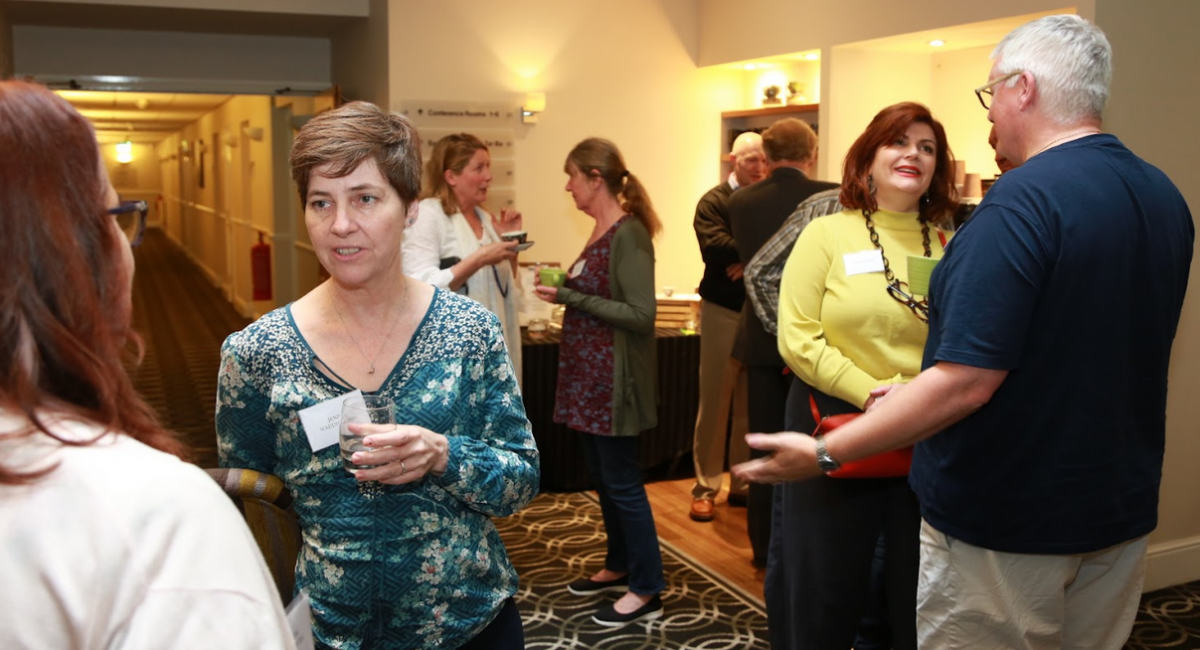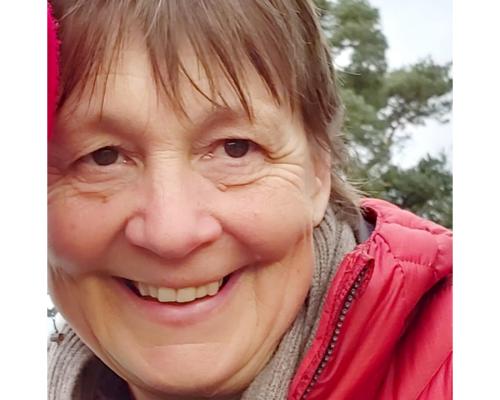2022 HGI Conference
Celebrating the widening spread of HG ideas, new understandings, and our practical and inspirational work, our latest in-person conference was a great success – it was lovely to meeting up with so many of the HG community in person once again – and to hear to hear about new insights and HG developments, listen to inspiring and stimulating talks and case histories, engage in thought-provoking discussions and much more. For the full programme, see below.
|
PROGRAMME – Saturday 14th May 2022
|
|
| 9.00 |
Registration |
|
9.30 |
Introduction to the conference |
| 9.45 |
Brain inflammation and disturbed sleep GP and HG practitioner Andrew Morrice shows that the links between inflammation in the brain and disturbed sleep are more subtle and various than previously thought. The new detail deepens our understanding of depression and illuminates the connections between sickness behaviour, fatigue and malaise, and pain. |
| 10.30 |
Keeping HG up to date HG practitioner and Diploma tutor Gareth Hughes was tasked by HG College with undertaking a full review of the HG Diploma training, which he has carried out over a period of 18 months. He will explain where, how – and why – it has been updated. |
| 11.00 |
Tea/coffee break |
| 11.30 |
From jokes and myths to tricks and dangerous moments Rob Parkinson is a seasoned professional storyteller as well as an experienced HG practitioner. In this lively talk, he shows how, using humour, stories and even shock, he has often found ways to make breakthroughs with particularly challenging clients. He sets this in the context of his PTSD Resolution work with hardened veterans; and with disaffected adolescents, often already engaged in criminality, whom he saw as a schools counsellor. |
| 12.00 |
Project 100 Bill Andrews, co-developer of Pragmatic Tracker, introduces Project 100, a major initiative which has recently been launched by PTSD Resolution. |
| 12.15 |
Just What We Need in the community HG practitioners Carmen Kane and Linda Hoggan, who originated the HG Just What We Need parents’ programme in 2007, to help parents better understand their own needs and, therefore, those of their children, update us on its development into the wider community, where it is now being used with other recipients. They demonstrate how applying the Just What We Need approach can enhance therapeutic skills, enabling practitioners to be more inclusive, concrete and creative. |
| 13.00 |
Lunch |
| 14.15 |
When a client complains… Mark Stobbs, Director of Scrutiny and Quality at the PSA, leads a challenging, interactive session on circumstances which, unexpectedly, might lead to complaints from a client against a therapist, and how to anticipate/avoid or best handle. He is also willing to respond to questions from the floor – it would be especially helpful to have these in advance, so that Mark can give them thought. Please send any question suggestions to [email protected] Eg: is it okay to see an existing client’s partner individually about their own issues, at the request of both? What are the pitfalls when trying to find clients to ‘practise’ on, when still a trainee? |
| 15.45 |
Come join us! A brief update on the work of the Registration and Professional Standards Committee (RPSC). |
| 16.00 |
Tea/coffee break |
| 16.30 |
Working with refugees and asylum seekers HG practitioner Malcolm Hanson discusses his experience of receiving NHS referrals (often for the effects of torture, persecution or other forms of control) for trafficked individuals and those seeking asylum. His talk includes an overview of people’s perception of the system they find themselves in, treatment strategies he found most effective, issues around use of translators and outcome measures, impact on the therapeutic relationship with this client group, and dealing with asylum outcomes and how to manage them with clients. |
| 17.15 |
Conference Day ends |
| 20.00 |
Conference Dinner |
|
PROGRAMME – Sunday 15th May 2022
|
|
| 9.00 |
Registration |
| 9.25 |
Introduction |
| 9.30 |
The paradox of schizophrenia Drawing on cutting-edge neuroscience, Ezra Hewing, HG practitioner and head of education at Suffolk Mind, presents fascinating evidence for the theory that hallucinations can be explained as REM state phenomena, and also resolves the paradox of dual negative and positive symptoms in schizophrenia. Identifying mechanisms which underlie psychosis and REM state phenomena has been the focus of Ezra’s MSc research at the Institute of Psychiatry, Psychology and Neuroscience, King’s College London. |
| 10.30 |
What ENA is telling us about mental health in organisations Naomi Simons, research and data lead at Suffolk Mind, describes how, using a version of the Emotional Needs Audit (ENA), data collected from over 6,000 people living in Suffolk show how well, or not, their emotional needs are being met. These include employees from NHS hospitals and clinical commissioning groups, a creative arts organisation, a fire safety business and Suffolk Mind’s own staff, as well as the general Suffolk population. Surprising findings include the stable and predictable pattern that has emerged and what it tells us about the environments people live and work in; how ENAs can identify hierarchy and autonomy in organisations; the needs which are best met at the expense of others; and how this information can be used to improve mental health and workplace performance. |
| 11.00 |
Tea/coffee break |
| 11.30 |
Using HG to change the culture in care homes Sue Gray, HG practitioner and consultant for Eastside Primetimers, a social sector management consultancy, describes outcomes so far in a pioneering consultancy project at an 80-bed specialist care home for people with complex disabilities. The aim is to use the human givens model to help change the prevailing ‘I care for you’ culture into a more re-abling one, where individuals are enabled to meet their own needs wherever possible. Staff, volunteers, residents and family members are all being educated in HG understandings and in practical ways to use needs and resources to influence processes such as re-ablement planning, creating a therapeutic day and monitoring wellbeing, so that together they can create the changing culture. Research and evaluation are designed into the programme throughout. |
| 12.00 |
The first national mental health charter for universities HG practitioner Gareth Hughes is a recognised expert in student mental health and the links between learning and wellbeing. In this talk, he describes his major role in developing the first national mental health charter for universities, a government-backed project designed to help universities support good mental health in staff and students. The framework for this aspirational charter launched in 2019. This year 41 universities have signed up to be part of the first cohort working towards Charter status. The Higher Education Minister has written to all universities setting her expectation that they all apply for the award within five years. Gareth tells the compelling story of how the university sector and government were brought onside in taking a whole system approach to mental health – one that goes beyond services into all aspects of university life that impact on needs, from physical environment through to social life. |
| 12.30 |
Therapy with young people: where do the parents fit in? How far and in what ways should parents be involved when HG practitioners are working with young people? Drawing on her long experience as an HG practitioner in private practice and family therapist for her local CAMHS, Miriam Chachamu shares what she has learned about including parents in therapy, how to set this up, what to be wary of, how to deal with conflicts between what parent and child may want, overcoming the difficulties when parents are not together and do not get on, etc. She illustrates the positives and the pitfalls through vivid case histories and explains the view she has arrived at, regarding the value of parents' involvement in therapy. |
| 13.00 |
Lunch |
| 14.15 |
Professional survival skills in an age of political and corporate nonsense Gavin Jinks, HG practitioner and senior lecturer in social work at the University of Derby explores how we can best cope with the plethora of changes to working practice or culture that get passed down from management or government, with remarkably little evidence to support them. He shows how easy it is for those in power to publish, manipulate or control information in a way that avoids scrutiny and argues that individuals or small groups can take practical and powerful steps that make a big difference, drawing on examples from different sectors to illustrate this. |
| 15.00 |
Resurrecting common sense Ivan Tyrrell explains how the wisdom in HG ideas and skills grew out of common sense. There is no wisdom where there is no common sense because, under that condition, it cannot find any expression. That is why, he says, when HG practitioners come up against rules created by people devoid of common sense, our task, first and foremost, is to find ways to vigorously champion this endangered characteristic. |
| 15.30 |
Tea/coffee break |
| 16.00 |
Taking HG onwards and outwards Questions and discussion around or beyond the ideas explored by Gavin and Ivan, with contributions related to personal and professional experiences welcome from the floor. |
| 17.00 |
Thanks and close |
Latest Tweets:
Tweets by humangivensLatest News:
HG practitioner participates in global congress
HG practitioner Felicity Jaffrey, who lives and works in Egypt, received the extraordinary honour of being invited to speak at Egypt’s hugely prestigious Global Congress on Population, Health and Human Development (PHDC24) in Cairo in October.
SCoPEd - latest update
The six SCoPEd partners have published their latest update on the important work currently underway with regards to the SCoPEd framework implementation, governance and impact assessment.
Date posted: 14/02/2024




















